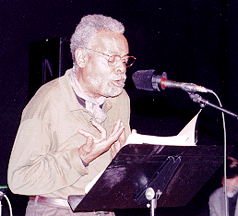Amiri Baraka 1961
For Kellie Jones, born 19 May 1959

Lately, I've become accustomed to the way
The ground opens up and envelopes me
Each time I go out to walk the dog.
Or the broad edged silly music the wind
Makes when I run for a bus...
Things have come to that.
And now, each night I count the stars.
And each night I get the same number.
And when they will not come to be counted,
I count the holes they leave.
Nobody sings anymore.
And then last night I tiptoed up
To my daughter's room and heard her
Talking to someone, and when I opened
The door, there was no one there...
Only she on her knees, peeking into
Her own clasped hands
Explorations to The Text
- What is the mood of the speaker in the opening lines? What images suggest his feelings?
Lately, I've become accustomed to the way
The ground opens up and envelops me
Each time I go out to walk the dog.
Or the broad-edged silly music the wind
Makes when I run for a bus........
2. What is the significance of the daughter's gesture of peeking into "her own clasped hands"?
The significance of the daughter's gesture of peeking into "her own clasped hands" can be imagined as an act of kneeling in prayer. The daughter's hope is suggested to be contrasted the father's state of hopelessness. The girl is suggested to have a belief in God and is suggested to pray for calmness and serenity from the obstacle that her father has gone through.
3. What does the title mean? How does it explain the closing line?
The title of the poem represents the beginning of the speaker's melancholic monologue before coming to an idea of attempting suicide. This poem somehow shows a contradiction to the closing line as the last stanza the daughter's clasped hands has displayed a hope in himself which encourages him to persevere till the end.
4. Why does Baraka have three short lines, separated as stanzas? How do they convey the message of the poem?
The three short lines are used to display the speaker's monologue where he is concluding his preceding stanzas per stanzas.
5. Why does Baraka begin stanza with "Lately", "And now" and "And then"? What do these transition words accomplish?
These transition words "Lately", "And now" and "And then" show the arrangement of the situation which has been faced by the speaker.
On the first stanza, "Lately" is used to show the current daily routine which he has been repeating day by day."And now"shows the overwhelming hopelessness in him which has taken control of his emotion, which is suggested that he was in a state of depression. Lastly, "And then" shows the opening line of new hope where the speaker saw his own daughter was "Talking to someone"(Stanza 5, line 14) with her hands clasped, which is suggested in line 17.This can be suggesting the possible ending for the speaker's monologue and possibly wished to stop dwelling in hopelessness.
6. How does the speaker feel about his daughter? What does she represents to him?
The speaker sees her daughter as a ray of hope. The speaker can be suggested to be rather proud of his daughter for believing in the existence of God in providing serenity to her life. His daughter symbolises the speaker's remedy for his overwhelming hopeless in the first four stanzas.

No comments:
Post a Comment